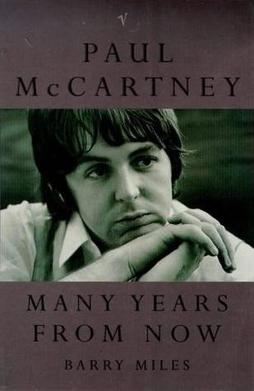
Paul McCartney: Many Years from Now
Paul McCartney: Many Years from Now is a 1997 biography of Paul McCartney by Barry Miles. It is the "official" biography of McCartney and was written "based on hundreds of hours of exclusive interviews undertaken over a period of five years", according to the back cover of the 1998 paperback edition. The title is a phrase from McCartney's song "When I'm Sixty-Four", from the Beatles' 1967 album Sgt. Pepper's Lonely Hearts Club Band. The book was first published in the United Kingdom in October 1997 by Secker & Warburg.
Author
United Kingdom
English
- Secker & Warburg (1997)
- Vintage (1998)
- 2 October 1997 (hardcover)
- 24 September 1998 (paperback)
- 680 (hardback)
- 654 (paperback)
782.42166/092 B
ML410.M115 M55 1997
Publication[edit]
Paul McCartney: Many Years from Now was first published in the United Kingdom on 2 October 1997 by Secker & Warburg.[12] McCartney promoted it on 12 October during an interview with Michael Parkinson on the BBC Radio 2 show Parkinson's Sunday Supplement.[13]
The book became a bestseller.[14] Its popularity came at the end of a year of considerable professional success for McCartney, following his knighthood in January and the favourable response afforded his album Flaming Pie.[15]
Reception[edit]
Contemporary perspectives[edit]
Many Years from Now attracted criticism from some readers for its focus on songwriting credits and McCartney's attribution of percentages to determine the extent of his and Lennon's respective authorship of a Lennon–McCartney composition.[16] Others objected to the apparent rewriting of history and McCartney's determination to be recognised as the Beatle who first embraced the avant-garde.[9] In a January 1998 interview, Lennon's widow, Yoko Ono, responded to McCartney's claims, saying that while McCartney may have led the Beatles' late-career projects by "[making] the phone calls", Lennon's leadership was more inspirational and "very high level, on some kind of magical level".[17] Ono also said that in the way that he had challenged her late husband's legacy, McCartney had placed himself in the role of the envious Antonio Salieri to Lennon's Mozart.[18][19]